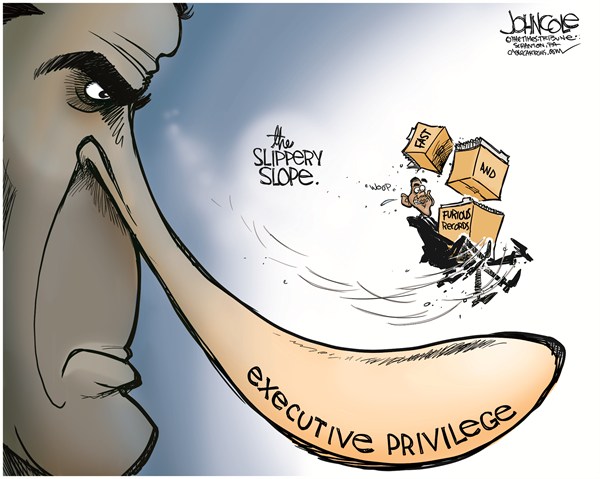Search
Democracy Links
Member's Off-site Blogs
walking a mile in borrowed shoes .....

When George W. Bush was president of the United States, it was an article of faith among liberals that many of his policies were not just misguided but unconstitutional as well. On issues large and small, from the conduct of foreign policy to the firing of United States attorneys, the Bush White House pushed an expansive view of executive authority, and Democrats pushed right back - accusing it of shredding the constitution, claiming near-imperial powers and even corrupting the lawyers working in its service.
That was quite some time ago. Last week the Obama White House invoked executive privilege to shield the Justice Department from a Congressional investigation into a botched gunrunning operation by the Bureau of Alcohol, Tobacco, Firearms and Explosives. The previous week the White House invoked powers that President Obama himself had previously claimed to lack, unilaterally revising the nation's immigration laws by promising to stop enforcing them against a particularly sympathetic population.
Both moves were entirely characteristic of this presidency. Obama campaigned as a consistent critic of the Bush administration's understanding of executive power - and a critic with a background in constitutional law, no less. But apart from his disavowal of waterboarding (an interrogation practice the Bush White House had already abandoned), almost the entire Bush-era wartime architecture has endured: rendition is still with us, the Guantánamo detention center is still open, drone strikes have escalated dramatically, and the Obama White House has claimed the right - and, in the case of Anwar al-Awlaki, followed through on it - to assassinate American citizens without trial.
These moves have met some principled opposition from the left. But the president's liberal critics are usually academics, journalists and (occasionally) cable-TV hosts, with no real mass constituency behind them.
The majority of Democrats, polls suggest, have followed roughly the same path as the former Yale Law School dean Harold Koh, a staunch critic of Bush's wartime policies who now serves as a legal adviser to the State Department, supplying constitutional justifications for Obama's drone campaigns. What was outrageous under a Republican has become executive branch business-as-usual under a Democrat.
On domestic matters, the liberal silence is even more deafening. It was conservatives who pointed out the dubious constitutionality of Obama's immigration gambit. Among liberals, it was taken for granted that the worthy ends were more important than the means.
Two forces are at work here. One is the intersection of power and partisanship, which produces predictable hypocrisies when one side passes from critiquing authority to embodying it.
These turnabouts can be quite startling. A progressive Web site noted the irony of liberal opinion's shift on Gitmo: "Under the leadership of a President who campaigned with the promise to close the facility but reneged, support for the detention center may be at its highest level ever."
But these turns are not always a bad thing. Sometimes it was the original partisan critique that was overdrawn, and sometimes power educates rather than corrupts. If the view from the State Department looks different from the view from Yale Law School, it isn't necessarily the State Department that's wrong.
What's more perilous is the extent to which these sudden shifts reflect something unique to constitutional debates - namely that arguments for constitutional limits tend not to sway people who don't already have a political incentive to support them.
Partisan about-faces are inevitable, but they're arguably easier on constitutional matters. Change your mind on immigration, and your constituents may well revolt. Change your mind on whether a president has the power to do things on immigration policy that your constituents already support, though, and only your partisan critics and the occasional law professor will care.
This is why it's so remarkable that our constitutional order has lasted so long, given the perpetual incentive - common to both parties, and all three branches of government - to abandon its safeguards in order to push a particular agenda.
Today those incentives are strongest for Democrats - visible in their support for Obama's more dubiously constitutional forays, and also in the widespread liberal attempt to explain his struggles by casting him as a Gulliver tied down by an antiquated system of government.
Conservative pundits have noted that similar explanations were proffered to explain the failures of Jimmy Carter. That in and of itself isn't proof that they're wrong. But it suggests the possibility that some of the ways this president has been baffled, legislatively and perhaps soon in the courts, reflect the genius of our constitutional system rather than its failings. It's a system that often lacks principled defenders, but that's designed to defend itself.
- By John Richardson at 25 Jun 2012 - 3:52pm
- John Richardson's blog
- Login or register to post comments
Recent comments
4 hours 28 min ago
5 hours 45 min ago
6 hours 25 min ago
7 hours 22 min ago
16 hours 23 min ago
16 hours 37 min ago
21 hours 17 min ago
22 hours 42 min ago
22 hours 50 min ago
23 hours 50 min ago